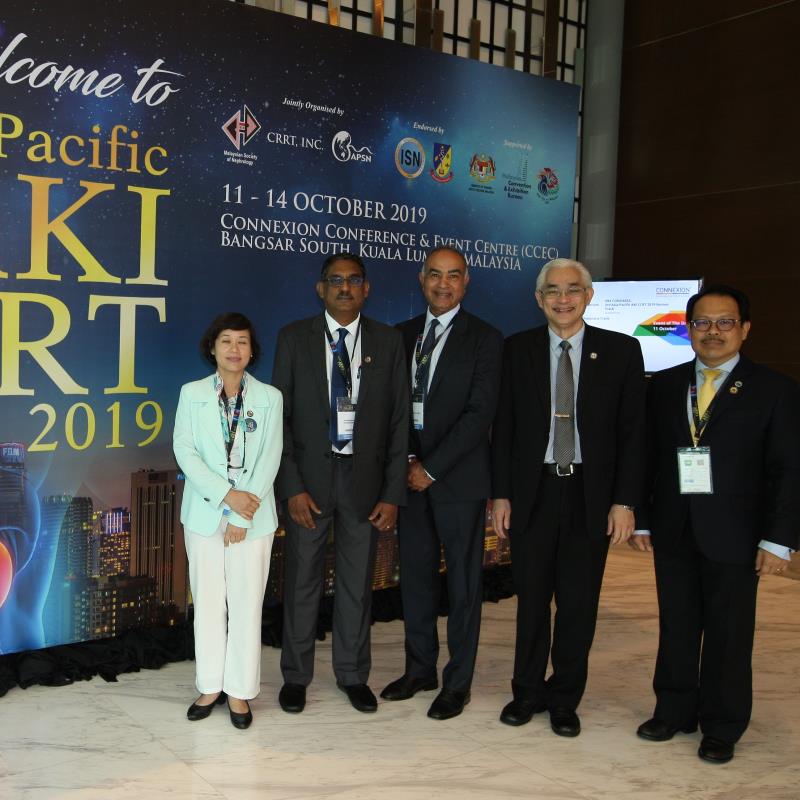 L-R: Dr Sunita Bavanandan, Dr Ravindran Visvanathan, Dr Ravindran Mehta, Dato' Dr Ong Loke Meng, and Professor Goh Bak Leong.
L-R: Dr Sunita Bavanandan, Dr Ravindran Visvanathan, Dr Ravindran Mehta, Dato' Dr Ong Loke Meng, and Professor Goh Bak Leong.A panel of eminent nephrologists came together to call for greater awareness and prevention of acute kidney injury (AKI).
The panel consisted of Professor Ravindra Mehta, Emeritus Professor of Medicine, University of California San Diego and President of CRRT Inc.; Dato’ Dr Ong Loke Meng, head of National Nephrology Services; Dr Sunita Bavanandan, president of Malaysian Society of Nephrology; Professor Goh Bak Leong, immediate past president of MSN; and Dr Ravindran Visvanathan, congress president of 3rd Asia Pacific Acute Kidney Injury & Continuous Renal Replacement Therapy (AKI CRRT 2019) conference.
According to the panel, AKI often falls under the radar as it has no associated symptoms to recognize and people do not know their kidney is failing until it is way too late. Ravindra also alluded to the 0by25 initiative by the International Society of Nephrology (ISN), which sets the organization’s vision for a world where nobody dies of preventable and treatable AKI by 2025. 0by25 aims to achieve their goals by three key ways—providing evidence to demonstrate the global burden of AKI; improve awareness and education of AKI across the healthcare community; and work with the most affected communities to develop a sustainable infrastructure, which enables ‘need driver’ approaches to education training and care delivery.
Ong said the prevalence of AKI in the local setting (as sampled in seven MOH hospitals treating AKI) is 7.2 percent. The factors contribution to AKI include consumption of traditional herbal medication and NSAIDs use. He cautioned patients from self-prescription when they are ill, as such an action could exacerbate existing kidney conditions. Ong also cautioned that AKI can occur on top of chronic kidney disease and such a situation should be considered a medical emergency. Failure to treat in time could rapidly bring the patient to end-stage renal disease.
The experts were speaking at the AKI-CRRT conference, held in Kuala Lumpur, recently. The conference is meant to mirror the international CRRT conference held in San Diego earlier in the year. The purpose of the Asia Pacific AKI-CRRT conference is to allow healthcare professionals in the region the opportunity to access knowledge and skills from world experts in the field of AKI and CRRT.
About AKI
AKI is defined as a sudden episode of loss of kidney function or kidney damage that happens within a few hours or days. This results in a buildup of waste products in the blood and makes it hard for the kidneys to maintain the right balance of fluids in the body.
More recently, evidence points to AKI being a multi-organ dysfunction involving the other organs, rather than the traditional view that it is a single organ failure. AKI is estimated to occur in up to 15 percent of hospital inpatients and is more common in critically ill patients, where prevalence can be up to 60 percent.
While patients suffering from AKI can recover, the condition sets them up for a greater risk of health consequences in future—including recurrent AKI, progression to chronic kidney disease or end-stage kidney disease; disability and death. Treatment is usually by prevention of worsening damage to the kidneys until the patient recovers.
AKI can develop in both hospital and community settings. In the hospital setting, AKI is usually due to drug use, contrast agents for imaging, and nonsteroidal anti-inflammatory drugs. Sunita said: “Drug-related AKI is just one area where we can do more in terms of prevention.” In the community setting, AKI is usually the result of an infection such as malaria or leptospirosis.
Furthermore, the panel also warned against the misperception that herbal medicines are natural and therefore non-toxic. They said: “This (perception) may not be true and we need to be cautious about using unregistered and untested natural remedies that are obtained by word of mouth, direct marketing or advertised on in the Internet. Some may potentially cause harm not just to the kidneys but also to the liver, immune system, and more.”